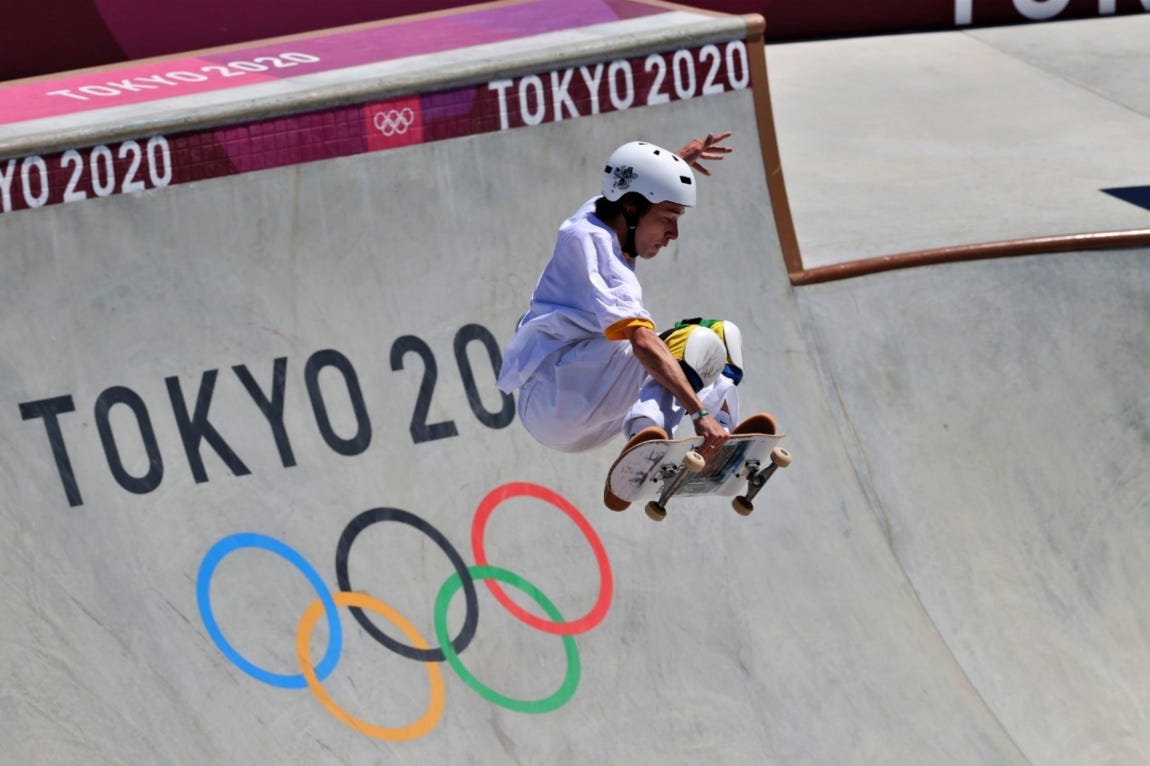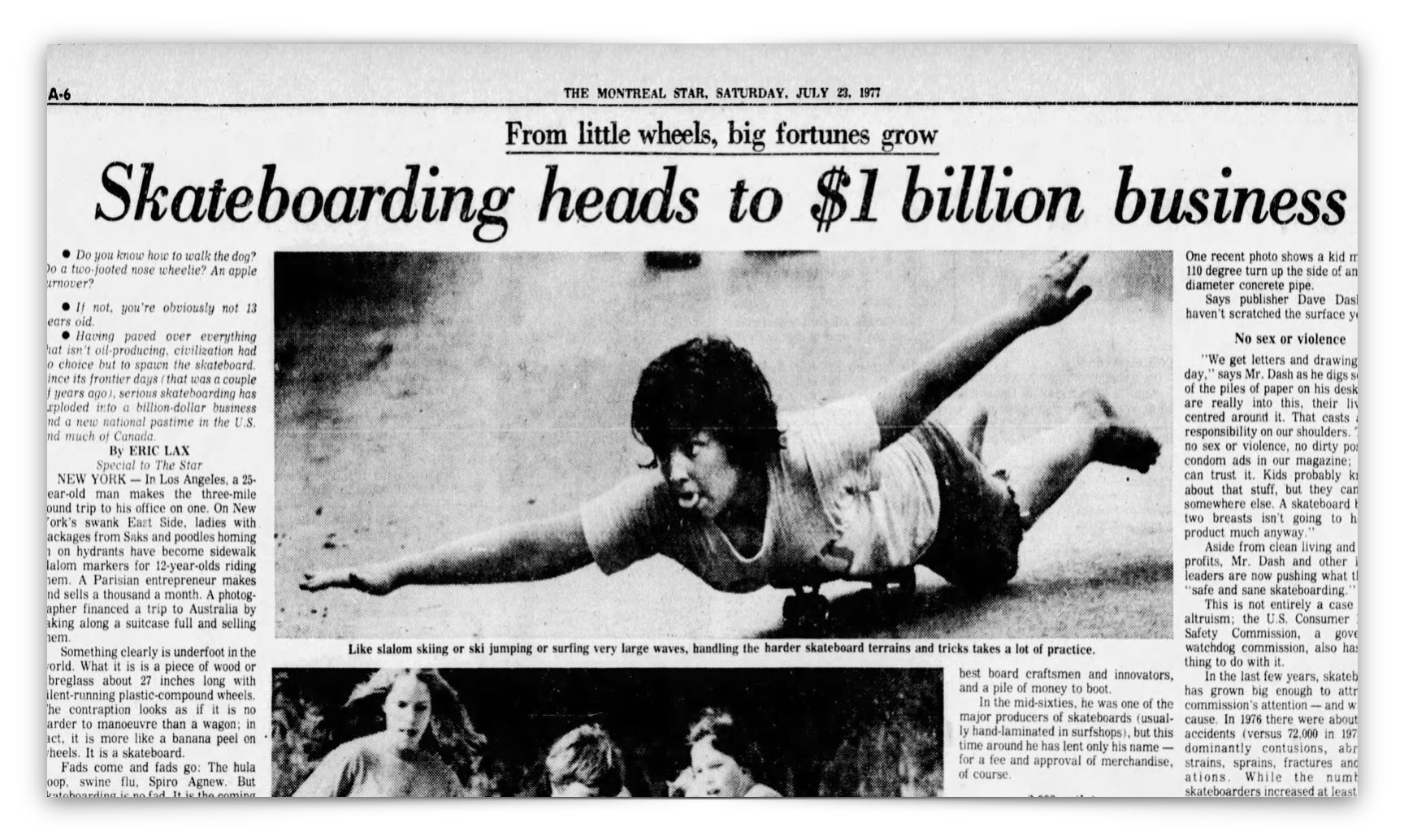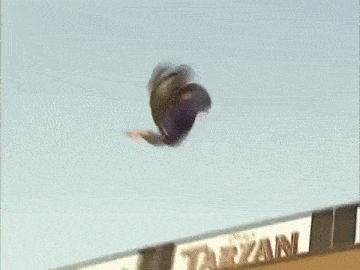Skateboarding: from Nuisance to Olympic Sport
Skateboarding was considered a silly and childish phenomenon for much of its existence
Skateboarding emerged in the late 1950s, with the first boards typically crafted by affixing roller skate wheels to short planks of wood. This DIY approach marked the humble beginnings of something that would become a global phenomenon - and eventually an Olympic sport.
Skateboarding would see opposition almost immediately. The term "skateboards" firsts appeared (in the press) in a 1959 Los Angeles Times report about efforts to ban them in Pasadena, California. Its justification? An increasing number of accidents and injuries.

Skateboarding culture grew rapidly through the 1960s, with the rise of competitions and magazines dedicated to this new sport.
The real risk of injury, coupled with the noise of boards hitting concrete didn’t just concern older generation, it irritated them - making skateboarding an easy target for prohibitions across the US.
The war on skateboarding didn’t stop this burgeoning industry and culture - after a brief industry slump in the mid-1960s - the skateboarding industry bounced back in the 1970s, by 1977 it was a $1 billion business.
The same year the United States Consumer Safety Product Commission reported 28 deaths and 100,000 injuries related to skateboarding - causing a new wave of concern and anti-skateboarding laws.
As skateboarding culture spread beyond the United States, this data was cause for concern - when skateboards came to Norway in the late 1970s, this data prompted a decade long skateboard prohibition between 1978 to 1989: their use, ownership, sale or marketing was strictly prohibited:
"The Environment Ministry said protecting children is more important than letting big business make money" - United Press International
That didn’t stop some Norwegians skateboarding anyway: in 2016 Chris Stokel-Walker interviewed those that defied the ban in 2016 for the BBC - the piece detailed how some smuggled boards into the country, with one pointing out “Not even North Korea has banned skateboarding." Some built skateboard ramps in isolated forest areas, others were arrested and had their boards confiscated.

In the mid-1980s Norwegian skateboarders petitioned the government to allow skateboard clubs with their own ramps - they were granted the concession - which marked the beginning of the end of a ban. The law would be repealed by Norway in 1989, one official said in retrospect: “We were trying to stop the problem before it stated. There were so many pirates importing and selling skateboards that it was difficult to control.”

The late 1980s and early 1990s would see the rise of ‘street skating’ fueled by consumer video cameras, allowing skate videos to be cheaply produced and distributed on VHS. In this period ‘Skateboarding is Not a Crime’ would become a rallying cry in defense of the sport, after being adopted as a marketing slogan by a skate company.
The rise of street skating would see architects designing outside spaces to be ‘skateboard proof.’ Injury data continued to cause concern and drive new laws.
The 1990s saw the ‘X Games’ competition launch - a kind of Olympic Games for extreme sports. In 1999 Tony Hawks would land the first 900 at an X Games event - garnering him world wide fame:
Later that year ‘Tony Hawks Pro Skater’ launched on Playstation, introducing the sport to a whole new generation. It would be another 20 years before Skateboarding would be considered an Olympic sport during the 2020 Tokyo Olympic Games.

One enterprising skate shop created a t-shirt to celebrate the milestone, a tongue in cheek homage to the decades of opposition and criminalization of skateboarding.
What Can We Learn?
Often what is considered real ‘sport’ or real ‘art’ is determined by the level of societal acceptance and approval. Similarly photography took a long time to be considered real ‘art’ - a good reminder that everything was once strange and unfamiliar. In-fact the wheels used to make the first skateboards came from roller-skates - a past-time once derided and dismissed.













sigma
I mean, that's still the prevailing attitude to skateboarding around me and a prime example of "they'll let anything to the Olympics now". Then again, I personally consider basically all sports dumb...